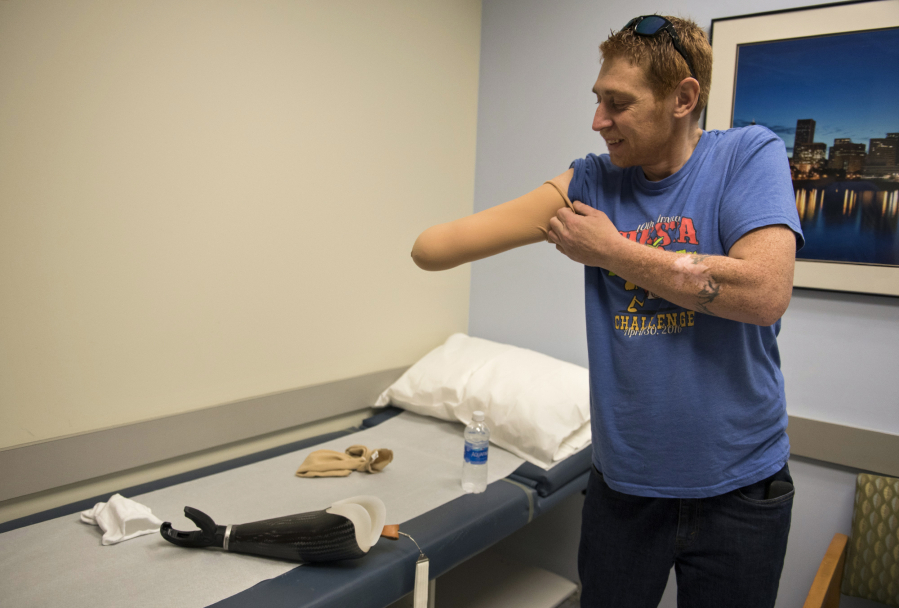Travis O’Brien grinned as he pulled the sleeve made of pantyhose-like material up over his elbow. He stood in the nondescript room and anxiously waited for his appointment to begin.
A wide smile broke across the 36-year-old’s face as Mark Sauser, a prosthetist, walked into the room carrying a black carbon-fiber prosthetic arm.
“This is freakin’ sweet,” O’Brien said.
O’Brien used his left hand to tug the prosthetic arm over the stub below his right elbow. Then he slipped his left arm through the loop of a strap attached to the prosthetic. Every time O’Brien shifted his left shoulder, the lobster-like claw at the end of the prosthetic arm closed.
“This is huge,” the Vancouver man said. “I want to have two arms. I want to do things.”
For O’Brien, the prosthetic arm helps to close a chapter that consumed not only his flesh but years of his life.
“I’m a recovering drug addict,” O’Brien said. “This is a prime example of what happens.”
About two years ago, a ladder fell on and broke O’Brien’s right forearm while he was working a side job. At the time, O’Brien, an electrician, was addicted to heroin. He ignored the broken arm. He didn’t care about getting it fixed.
So, instead of seeking medical attention, O’Brien tried to take care of his arm himself. Every morning, O’Brien would wake up and reset his arm and wrap it into place. After work, he’d party all night, sleep for a few hours and do it over again.
That went on for nine or 10 months, but O’Brien’s attempt to treat himself was anything but successful. His arm was slowly twisting from not being properly set.
Not only was his arm turning into an unnatural position, but an infection was ravaging the bone. In addition, O’Brien had an autoimmune disorder — unknown to him at the time — that was causing his kidneys to fail. His skin was turning yellow, as were the whites of his eyes. And he was becoming a shell of himself physically. His athletic 6-foot frame was carrying only 160 pounds.
“I’m literally going to work and coming home, but I’m killing myself,” O’Brien said.
That realization prompted him to finally seek medical attention, but not because he was motivated to get better.
“In my head I was thinking, ‘I’m going to die. I’m not going to be able to get high,'” O’Brien said.
At the emergency room, doctors uncovered an open sore spanning the width of an adult hand on O’Brien’s right forearm. The infection had eaten away so much of his flesh that both bones were exposed. He underwent surgery and spent 16 days in the hospital, where he was treated with methadone to manage his pain and heroin withdrawal.
After leaving the hospital, O’Brien went through intensive outpatient addiction treatment at Lifeline Connections. He’s been clean for about a year.
In an effort to save his arm, O’Brien met with a specialist in Seattle. There, he underwent another surgery and spent nine days in the hospital. For the following eight months, O’Brien’s arm was in a vacuum-sealed wrap to try to encourage healing.
“It just wouldn’t heal,” O’Brien said. “It just wouldn’t close up enough.”
At that point, O’Brien made the decision to have his arm amputated below the elbow. He was ready to move on with his life, and he couldn’t do that while dragging out what was likely inevitable.
“It was holding me back with my addiction and everything else,” O’Brien said.
He underwent surgery on Sept. 14.
Six weeks later, O’Brien was standing in the room at Evergreen Prosthetics & Orthotics receiving his new arm.
“How cool is that?” he asked rhetorically, marveling at the prosthetic.
Fighting addiction
O’Brien started using drugs about seven years ago. It began with pain pills and progressed to heroin. Before he knew what was happening, he was in the throes of addiction.
“I didn’t care if that killed me, as long as I could keep myself high,” O’Brien said.
“I didn’t care about most things,” he added. “I definitely didn’t care about myself.”
After completing the intensive outpatient program at Lifeline, O’Brien moved into another outpatient program at Lifeline. He’s still working his way through that program and attends weekly group and individual sessions. He also goes to Narcotics Anonymous and Heroin Anonymous meetings several times a week.
“I’m still a baby in it,” O’Brien said of recovery. “I wake up, and I take it one day at a time.”
O’Brien hid his addiction from his family and many of his friends, outside of the circle he was using with. His mom was crushed when she realized what was happening to her son.
“The biggest relief was when I could turn him over to doctors,” said June O’Brien.
When O’Brien looks back on the last couple of years, he doesn’t understand how he got to the place he was in.
“How could I have done this to myself?” O’Brien wondered aloud. “How could I have ever put my health behind being high? It had literally taken over.”
Now that the surgeries are done and he has his prosthetic, O’Brien is setting his sights on life in recovery. He wants to go back to school to study engineering. He also wants to work on his public speaking skills so he can spread his story.
O’Brien has sat in Narcotics Anonymous meetings with teenagers and wondered if his story could have been enough of a warning for them to change the course of their lives. He hopes to find out.
“If I could reach out and turn away just one of them from heroin or meth or whatever, if I could help just one person, I’d be happy,” O’Brien said. “It would bring purpose to my life.”




